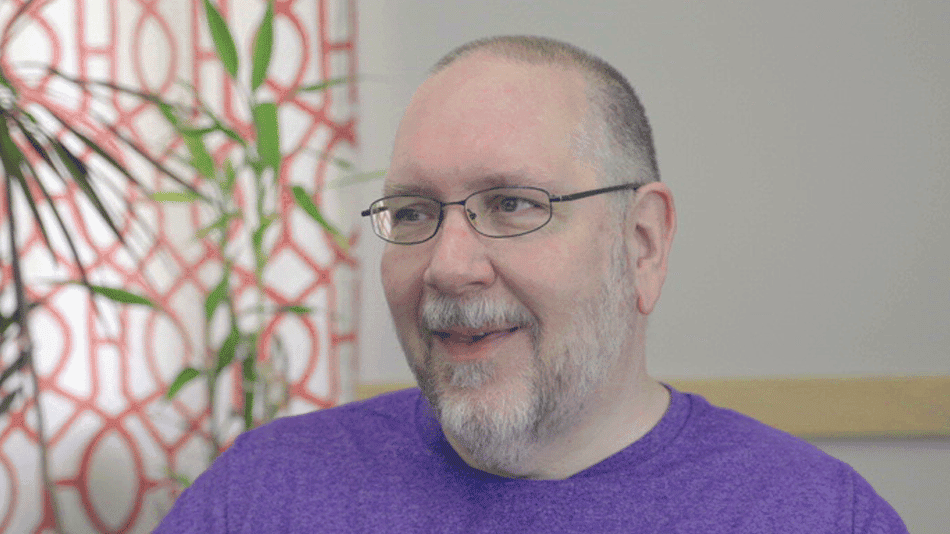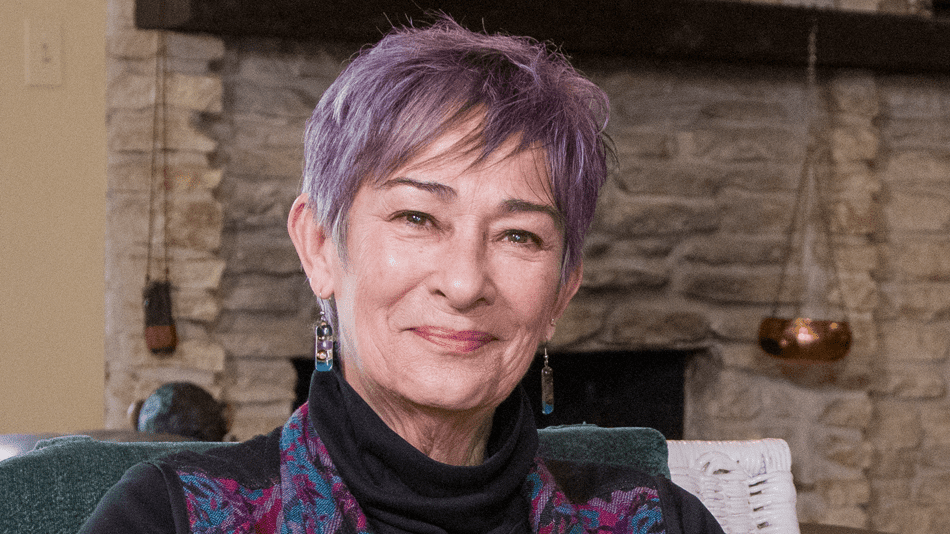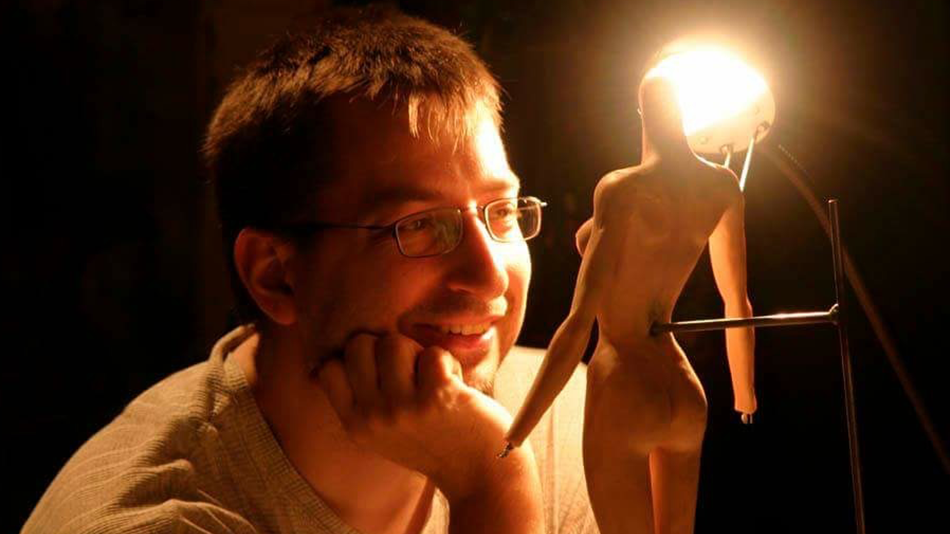Nathan: Welcome to this week’s Story Update, where we’re going to be speaking with Rosa Manriquez. And before we do, let’s take a look at her story.
Rosa: I’m Rosa Manriquez and I’m from Los Angeles. When people ask me what I am, if I’m LGBTQA, what am I, I tell people I’m neither. I don’t identify by my sexuality, I’m a mother and a grandmother. I was raised Catholic, I’m still very much Catholic, and I went to Catholic School and I was going to be a nun. But that went by the wayside when I met Enrique.
With Enrique, he was my first everything, first kiss, first date, everything. Fell in love with him, we got married and we ended up having children. But honestly there was no marriage there. Enrique was gay. He never came out of the closet but the signs were all there. Being a good Mexican wife I refused to see those signs. I just figured I could carry the family by doing what I had been taught to do. One morning he came home and told me I can’t do this anymore and he abandoned the family. And I found things like pictures and love letters and the like. And at that point for me the face of “gay” was Enrique. And I really hated him. And it followed that I hated anyone who was gay. His lovers and anyone else. And I honestly believed that anyone who was gay should go to hell. I was upset because my heart had been broken, I was abandoned with two little daughters, two infants, I had debt all the way through the roof. And it was really a difficult time for me but having my background, my up-raising, being raised Catholic and being devout, I realized that I couldn’t let a lie be the basis of my life, including the lie that he was all bad.
It was through a lot of prayer and retreats and talking to people I trusted as spiritual advisors and what I understood after a while was that Enrique was not a demon or an angel, he was not a Saint he was not a sinner, he was just a plain old human being. And that was really important because I knew that for the rest of my life I was going to be looking at the faces of those two little girls and I was going to see Enrique. And so as a Latina especially, familia is very important to us and no one can tell us that there is every any reason to not love our children.
When my youngest daughter Cecilia was in high school she came out to me. And what had happened was that, my daughter Cecilia is a really emotional person. If she’s happy, the whole world is happy, everyone is singing, it looks like a scene from Enchanted, she’s cooking, everything is great. But if she’s not happy, we all know, the dogs hide, the clouds cover the sky, we’re just careful around her. So she came home one day when she was in high school and she was just quiet, didn’t say anything. And I thought that was kind of strange. And she came up to me and she said, Mom, I’ve got something to tell you but don’t get mad. I thought she was pregnant. She started crying, she was just falling apart in front of me, and I got scared. I thought what if she’s hooked on drugs, what if she’s dating a drug dealer, all kinds of crazy nonsense. And she was having a hard time talking and getting the words out. And she told me, Mom, don’t hate me, I date girls. I like girls. Don’t hate me. And that was pretty hard because for me I would do anything for my kids. I think to myself, I would even die for my kids. And there would be no way I could hate them. I don’t understand this whole thing with a parent hating their kids, I don’t get it. But she was afraid of me believing with all her heart that I was going to hate her. We talked. I told her, Mija, I love you now the way I loved you before you told me, the way I’ll love you until I die. You’re my jewel, you’re my gift from God.
What concerned me was that growing up because she had been abandoned, she resented her father intensely. And it hurt me to see that it must have been so hard for her to struggle with knowing she’s lesbian and somehow connecting that some part of her father was inside of her, although I don’t think because he’s gay and she’s lesbian that that meant that part of him was inside of her. I mean, it’s like, it’s just who she is. But I could feel that that’s what she associated so it must have been a struggle, it must have been painful for her to admit to herself that she is lesbian.
I counseled her on love and commitment and trust and having self-respect for herself and all of these things you’re supposed to tell your children, and I think I did okay except for one thing that I told her, and that was, “Careful who you tell.” And I feel badly for telling her “Careful who you tell.” I told her out of fear but there’s something wrong with that, something very wrong. If she had been straight, I never would have told my daughter “Careful who you tell.” And it’s got to change. We can’t be worried that our kids are going to be harmed because of who they love.
Nathan: Okay. I’m so happy to see you again, Rosa. It’s been almost six years. How are you doing during this whole pandemic and how’s life?
Rosa: We’re doing remarkably well, actually. We have been restricted to our home, self-restricted to our home since March 13th. And we call this Rancho Gonzalez. It’s 10 of us here, 12 of you count the cat and the dog. Actually 13. We got another dog. And we’re doing very well. Thank you.
Nathan: Good. I’m glad that you’re, you’re hanging in there all right.
Rosa: I’m happy here. It’s lovely being with my family. I keep thinking if this is what heaven is like, what I’m living right now, I’m good with it.
Nathan: So one question that I have about your story, and there were some comments about this also on the YouTube video. If you don’t mind talking about it, have you been in touch with Enrique in the past, I mean, 10 years or the past five years or any amount of time after the events that happened in your story?
Rosa: He died. I imagine it must’ve been about 10 years ago. It probably may be even more. And we found out because my daughter, my youngest daughter, went to go visit her paternal grandmother with my mother. They went to go and visit. And every time she would do that – because it wasn’t the first time – but every time she would do it, she would ask for her father. And the last time she went, the woman told her, “Oh, he passed away last week.” So he did. And she was there in Juarez for a while, so she went to go and look for his death certificate and he did pass away from AIDS. From HIV/AIDS.
Nathan: I’m so sorry. That’s… that must be hard on you, but especially your daughter as well.
Rosa: I was going to say, you know, it bothered me and in a sense it does bother me a little bit, but not as much as the impact that it made on my youngest daughter. Although she has turned it around now, and she said, “I’ve never asked him for anything, but at this point I’m telling him that he has to be the guardian of my children. He owes them that much.”
Nathan: Wow. That’s well, thanks for the update on that. Is there… in your story, you, you know, and a lot of the comments kind of talk to this also about the journey that you went on to go from, you know, the quote that you use in the story that “all gays should go to Hell” to, you know, being so open and accepting and something I always loved about you sharing that story with how honest you were about that, about your journey. What would you tell to someone who is at the earlier steps of your journey, where, you know, they might have been with someone who came out as gay or left them or hurt them in some way, and they now have these negative feelings towards the queer community in general? What would you say to kind of help them through that journey?
Rosa: A good friend of mine now helped me. I understand the perspective of parents of children who are gay and are coming out. And it makes me think that well, that was me too. And what she told me was to be patient with myself, with, you know, my kids and him. Says, “They were ready to come out of the closet. You weren’t ready to come out of the closet. They were ready to be who they were. You weren’t ready to be the mother of these two lesbian women or the wife of a gay man. You weren’t ready for that. And it’s a process. It takes time.” And yeah, she was right. She was right.
Nathan: So just take time. You know, learn as you go along and accept what’s happening.
Rosa: You learn as you go along, you take it one step at a time. You know, it’s also saying goodbye to your own dreams, your own attitudes, your own thoughts of what life was supposed to be. It’s learning to say goodbye to that and accepting what life is. You know, it’s finding out what that joke means. How do you make God laugh? Tell God your plans, you know? You know, you’re expecting a white picket fence and the two children and the dog, and, you know, the scene from Little Shop of Horrors where she has the 1950s household, Donna Reed and the rest. No, no, that’s not what… that’s not what I was put here to live as.
And I would say don’t…don’t close any doors you don’t have to close. Don’t refuse to accept and embrace the happiness that is there. I feel really, really bad for people who decide, there is no joy in what happened at all. Yes, there is. There is joy. You know, Enrique had things that were really beautiful, too. And if anything, he had his own demons that he had to deal with. He may have dealt with them very poorly.
But you know, I mean, when it comes down to it, I can’t expect my dog to meow. My dog is not a cat. It could never meow, no matter how much I train him. Does that mean the dog is worthless? Of course not. The dog is precious. The dog is wonderful. It just doesn’t meow. And I think to be able to get to that just takes a lot of prayer, a lot of self-analyzing, a lot of looking at what we really expect out of life, learning how to enjoy what we do get.
Nathan: And what about people who say, you know, aren’t you mad at him for wasting all those years of your life? What would you say to them?
Rosa: Well, part of me is mad. Part of me… I used to think to myself, I’d forgiven him except I have to give them one good, hard right to the jaw and then I’ll be fine. Then I can look at him and tell him, “How the hell have you been, Henry?”
But, you know, what you feed is what will grow and to feed anger and regret and all of the rest of that, why feed that and let it grow? That’s useless. And when it comes down to it, it took the two of us to make this happen. And me not… not being willing and saying that I wasn’t able to really look at what the situation was, that was also a choice. And I really didn’t not end up with the raw end of the deal. Not at all. I’ve got a beautiful family. I ended up with two great daughters because of him. I ended up with three great grand- grandchildren, because of him. I ended up with two lovely daughters-in-law. I mean, my daughters are so lucky that you found these women. This is lovely. So to say I got nothing good out of this. Oh yes I did. Yes, I did.
Nathan: That’s… that’s beautiful. I love that. What… what else is going on in your life? You know, anything… I know it’s a pandemic and it’s hard to do stuff, but you know, any other things that are important to you right now that’s going on that you want it to share?
Rosa: I been doing some anti-racism type of work. I really did think when I retired a few years back that I was just going to be able to sit home and finally meet all the books I wanted to read. But now with the situation in our country, the way it is, and so anti-immigrant and refugee, anti-people of color in general, the economy really looking very, very bad, very poor, the pandemic itself with all of that, I find myself thinking, No, I can’t just sit home and vegetate.
I really did start wanting to help with, with people who are being detained in the detention centers. Concentration camps really. And the children who have been taken away from their families. And what that has gotten into has been anti-racism training and organizations that are liberal organizations that are not anti-racist at all.
And so, one of them is RCW… RCWP – Roman Catholic Women Priests. And through RCWP also, I was ordained a Roman Catholic priest. The Vatican’s not happy about that, but they’ll get over it. And yes, a lot of white feminists in there. And I was able to help get a very good friend of mine. Dr. Miguel De La Torre from Illif University to do a retreat on racism with them. And that push them on – the Western region anyway – into reading and in looking for action. And I think the Western region is going to become… is going to become more… become affiliated with the Poor People’s Campaign, which I think is awesome.
My community, the Immaculate Heart Community, also no anti-racism. And I pushed and I pushed and I pushed and I kept saying, Nope, you know, we… we are doing our banking with Wells Fargo and that is wrong. We have blood on our hands. And that kept falling on deaf ears and excuses. And finally, I said, I’m leaving. After more than 25 years, I’m leaving. And I think that shook some people up and I gave it a year and yes, we’re out of Wells Fargo. But it was one of – when Wells Fargo pulled out of the detention centers. And for me, that’s not good enough. We have to look at why do we do what we do.
And, I took some of the members of the community to Nogales for the School of the Americas Watch. And I took them to a demonstration outside of the Eloy Detention Center. And that did change hearts and minds when they saw what was going on at the wall and at the detention center. And so now, there is a push also for anti-racism training in the community.
Call to action, I left the mission council for a while. I had had pretty much enough. But I’m back again. And, I got on the anti-racism team there and I’m working now – then that’s the national organization. We’re working now and bringing in people from younger generations and actually doing things, not just writing letters and petitions. Doing things. So, yeah, there’s a few things I’ve done. I got arrested once, too. So just doing stuff.
Nathan: Wow. That’s a… that is not your textbook retirement plan there. But that thank you for doing all this important work during your retirement. That’s… I’m so happy for you and grateful for you. Thanks for doing all that. And also, thanks for taking the time to speak with us.
And if anyone has – who’s watching – has any questions for Rosa, leave them in the comments and Rosa, maybe you can check back periodically to see if anyone has questions for you. And if you want to watch more stories, they are available on our website. ImFromDriftwood.org and also on our social media. So check them out and thanks for watching. Bye.






Share